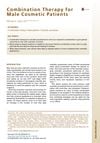 2 citations,
May 2021 in “Stem Cells International”
2 citations,
May 2021 in “Stem Cells International” Human pluripotent stem cells could be used to make platelets for medical use, but safety, effectiveness, and cost issues need to be resolved.
[object Object] 7 citations,
May 2012 in “Journal of veterinary diagnostic investigation” Some young Angus cattle had skin problems due to not enough vitamin A, which got better after they were given more vitamin A.
 9 citations,
September 2015 in “Medical Clinics of North America”
9 citations,
September 2015 in “Medical Clinics of North America” The document explains how to do skin procedures, care after surgery, and when to use certain treatments.
 November 2014 in “John Wiley & Sons, Ltd eBooks”
November 2014 in “John Wiley & Sons, Ltd eBooks” Eating high-glycemic and dairy foods can increase hormones that may cause acne and other health issues.
 68 citations,
May 2021 in “Endocrine”
68 citations,
May 2021 in “Endocrine” People with diabetes or obesity should manage their conditions carefully as they have a higher risk of severe COVID-19.
1 citations,
December 2023 in “Life” PRP helps skin heal, possibly through special cells called telocytes.

Regenerative cosmetics can improve skin and hair by reducing wrinkles, healing wounds, and promoting hair growth.
[object Object]  November 2020 in “Elsevier eBooks”
November 2020 in “Elsevier eBooks” Antiandrogens and androgen inhibitors like spironolactone, finasteride, and dutasteride can treat hair loss and skin conditions, but they have risks and side effects, including potential harm to pregnant women and risks of cancer and heart issues. Herbal remedies also have antiandrogenic effects but lack safety validation.
 1 citations,
November 2008 in “Gerontology”
1 citations,
November 2008 in “Gerontology” Older adults use lifestyle drugs to improve life quality and appearance, but caution is needed due to side effects and potential abuse.
 3 citations,
February 2016 in “Endocrinology and Metabolism Clinics of North America”
3 citations,
February 2016 in “Endocrinology and Metabolism Clinics of North America” Manage women's cholesterol with diet, exercise, and careful treatment choices, especially during pregnancy, PCOS, and menopause.
March 2023 in “Anais Brasileiros De Dermatologia” Topical minoxidil is the best-supported treatment for female hair loss, but personalized plans are needed.
1 citations,
November 2023 in “Life” Hyaluronic acid injections can improve mouth opening and quality of life in scleroderma patients.
1 citations,
August 2019 in “IntechOpen eBooks” Mesotherapy might be a useful addition to dental surgery to reduce drug use and side effects, but more research is needed.
 59 citations,
August 2004 in “Human Reproduction Update”
59 citations,
August 2004 in “Human Reproduction Update” Testosterone replacement can help women with low libido and mood, but they need to have enough estrogen first to avoid side effects.
 11 citations,
July 2017 in “Expert Opinion on Investigational Drugs”
11 citations,
July 2017 in “Expert Opinion on Investigational Drugs” New hair loss treatments may include topical medications, injections, and improved transplant methods.
1 citations,
March 2024 in “Nanomaterials” Biomimetic scaffolds are better than traditional methods for growing cells and could help regenerate various tissues.
 December 2023 in “Lasers in Medical Science”
December 2023 in “Lasers in Medical Science” Fractionated laser therapy, especially erbium-glass laser, effectively increases hair thickness in people with hair loss but doesn't increase the number of hairs.
 June 2021 in “bioRxiv (Cold Spring Harbor Laboratory)”
June 2021 in “bioRxiv (Cold Spring Harbor Laboratory)” Gene therapy in mice increased lifespan and improved health without causing cancer.
 16 citations,
March 2007 in “The Veterinary clinics of North America. Food animal practice”
16 citations,
March 2007 in “The Veterinary clinics of North America. Food animal practice” Proper mineral supplementation in cow-calf operations prevents health issues and economic losses.
 86 citations,
July 2012 in “British journal of dermatology/British journal of dermatology, Supplement”
86 citations,
July 2012 in “British journal of dermatology/British journal of dermatology, Supplement” There may be a connection between Frontal Fibrosing Alopecia and Lichen Planus Pigmentosus, and more research is needed to confirm this.
 46 citations,
January 2020 in “Theranostics”
46 citations,
January 2020 in “Theranostics” Injecting a special gel with human protein particles can help hair grow.
 7 citations,
April 2012 in “Clinical investigation”
7 citations,
April 2012 in “Clinical investigation” Transdermal testosterone can improve sexual desire in postmenopausal women but lacks long-term safety data and is not FDA-approved for this use.
34 citations,
September 2020 in “Clinical, cosmetic and investigational dermatology” Hyaluronic acid increases collagen synthesis safely, while poly-L-lactic acid may cause complications by affecting fibroblasts.
 August 2022 in “IntechOpen eBooks”
August 2022 in “IntechOpen eBooks” Congenital Adrenal Hyperplasia is a rare inherited disease causing hormone imbalances, affecting growth, fertility, and heart health, diagnosed through blood tests and treated with medication and lifestyle changes.
 May 2023 in “JAAD international”
May 2023 in “JAAD international” Minoxidil-dutasteride tattooing can potentially help regrow hair, especially in men who already have some thin hair.
December 2022 in “Molecular Pharmaceutics” Latanoprost-loaded nanotransfersomes could help treat hair loss by promoting hair growth.

The document is a detailed guide on skin conditions and treatments for dermatologists.
 66 citations,
June 2018 in “International Journal of Women's Dermatology”
66 citations,
June 2018 in “International Journal of Women's Dermatology” No cure for female pattern hair loss, but various effective treatments exist.
 1 citations,
November 2017 in “Dermatologic clinics”
1 citations,
November 2017 in “Dermatologic clinics” Combination therapies can improve hair loss treatment results and boost self-confidence in men.
 62 citations,
October 2017 in “JAMA facial plastic surgery”
62 citations,
October 2017 in “JAMA facial plastic surgery” Condensed nanofat with fat grafts effectively improves atrophic facial scars.






















